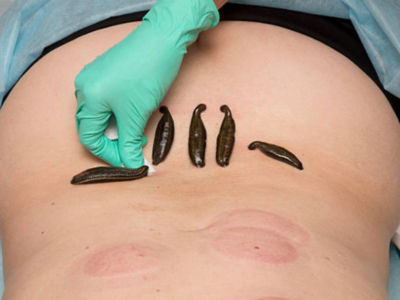Contact : +917892141002
Leech Therapy: An Ancient Healing Art for Modern Wellness
Leech therapy, also known as Hirudotherapy, is a form of alternative medicine that has been practiced for centuries. This age-old treatment involves the application of medicinal leeches to the skin, where they attach and feed on the patient’s blood. While it may sound unconventional, leech therapy is gaining renewed interest in modern healthcare due to its numerous therapeutic benefits.
The Science Behind Leech Therapy
Leeches possess a variety of bioactive substances in their saliva, which contain anticoagulants, anti-inflammatory agents, and analgesics. One of the most well-known anticoagulants is hirudin, which helps prevent blood clotting. When leeches are applied to the skin, they not only extract blood but also release these beneficial substances into the bloodstream, promoting healing and alleviating pain.
Health Benefits of Leech Therapy
-
Improved Circulation: Leech therapy can enhance blood circulation by breaking down blockages and promoting the flow of blood, which is particularly beneficial for patients suffering from conditions like varicose veins and peripheral artery disease.
-
Pain Relief: The anti-inflammatory properties of leech saliva can help reduce pain and swelling associated with arthritis and other chronic conditions. Many patients report significant relief from pain after undergoing leech therapy.
-
Wound Healing: Leech therapy has been found effective in enhancing the healing of wounds and surgical sites. The anticoagulant properties help prevent the formation of blood clots, thereby ensuring a better blood supply to the affected area, which aids in faster recovery.
-
Skin Conditions: Leech therapy is also used to treat various skin disorders, including psoriasis and eczema, as it helps to reduce inflammation and promote skin regeneration.
Safety and Considerations
Leech therapy should be performed by trained professionals in a sterile environment to minimize the risk of infections. It is important for patients to disclose their medical history, as leech therapy may not be suitable for everyone, especially those with bleeding disorders or compromised immune systems.
Conclusion
Leech therapy may seem unusual, but its therapeutic effects are supported by both historical and contemporary medical practices. As a natural alternative treatment, it offers a unique approach to health and wellness, making it an option worth considering for those seeking relief from various ailments. If you are interested in exploring leech therapy, consult a qualified practitioner to determine if it’s the right choice for you. With its potential benefits and minimal side effects, leech therapy could be a valuable addition to your wellness journey.
